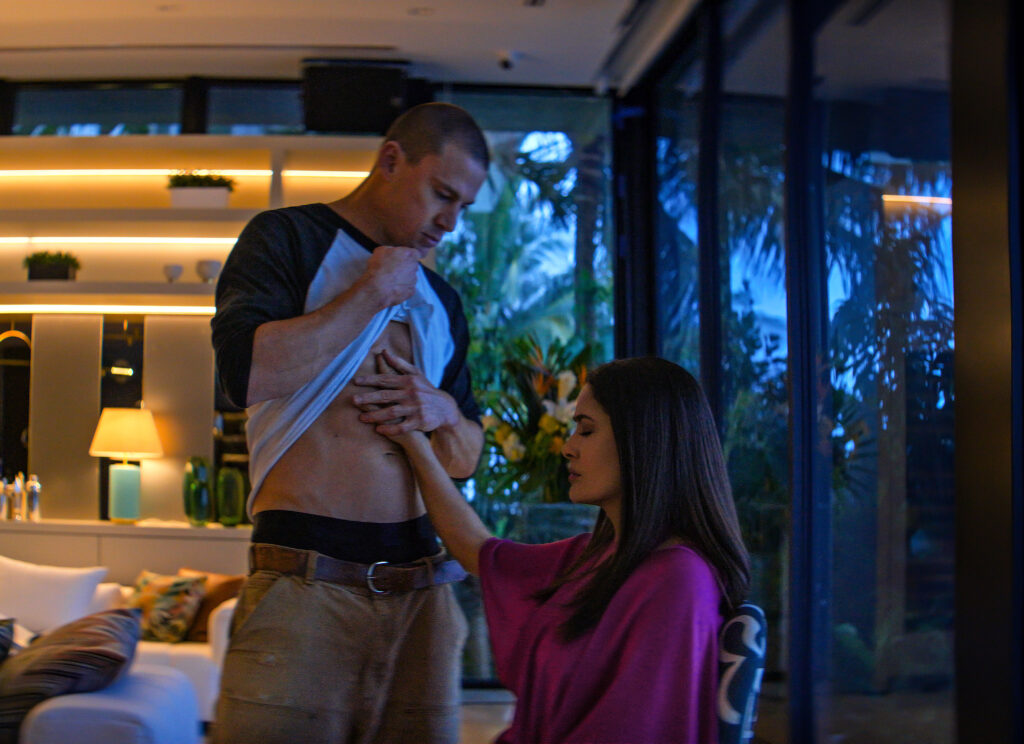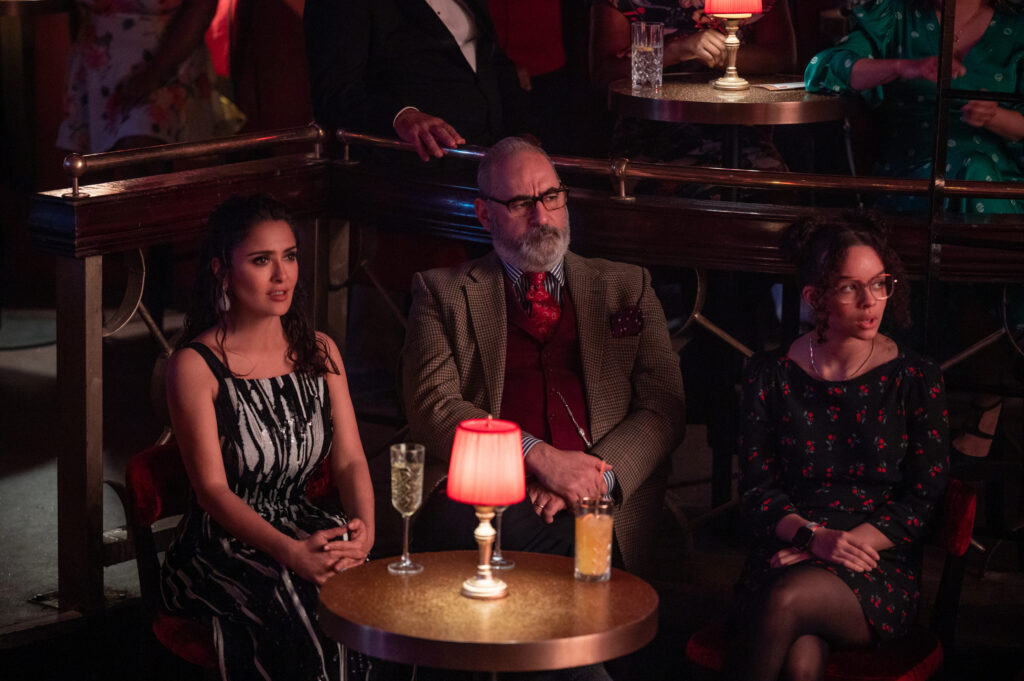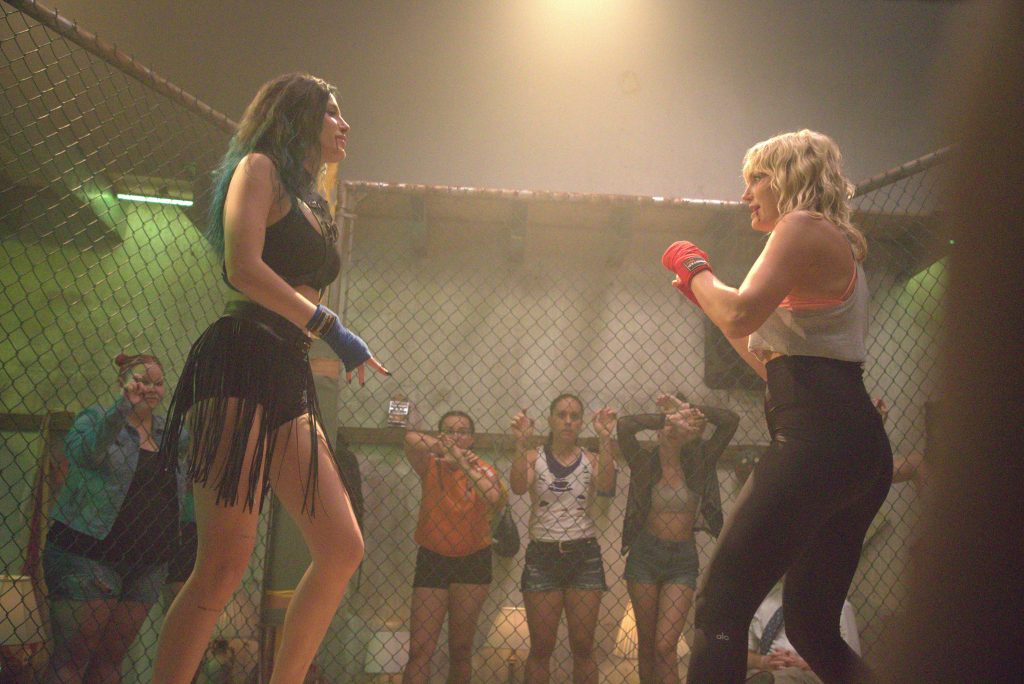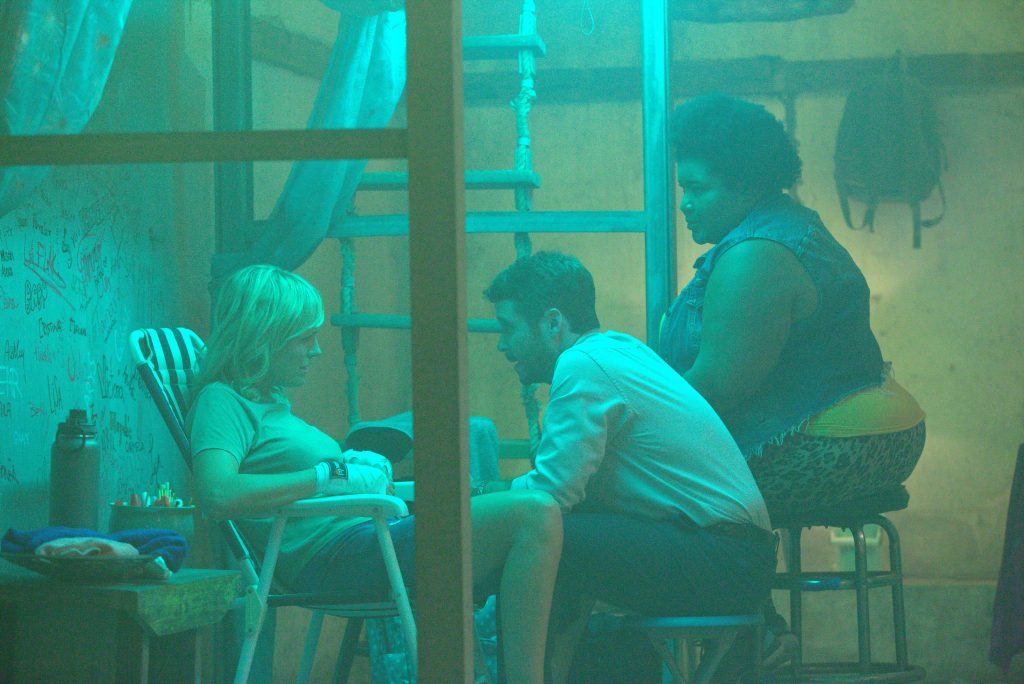February 7, 2023
by Carla Hay

Directed by Steven Soderbergh
Some language in Spanish and French with no subtitles
Culture Representation: Taking place primarily in London (and briefly in Miami), the comedy/drama film “Magic Mike’s Last Dance” features a predominantly white cast of characters (with some Latin people, black people and Asians) representing the working-class, middle-class and wealthy.
Culture Clash: Exotic dancer Mike Lane returns to the stage when he is invited by a wealthy socialite to choreograph, direct, and dance in an exotic dance show at the London theater that she owns.
Culture Audience: “Magic Mike’s Last Dance” will appeal primarily to people who are fans of stars Channing Tatum and Salma Hayek Pinault; the “Magic Mike” franchise; director Steven Soderbergh; and unapologetically predictable but charming movies featuring dancing and romance.

“Magic Mike’s Last Dance” is funny, sexy and the most emotionally layered “Magic Mike” movie, as it focuses more on the title character’s love life. The film stumbles with a contrived “race against time” plot development, but the performances are entertaining overall. People who are expecting the male friendship bonding that defined the first two “Magic Mike” movies will be disappointed in “Magic Mike’s Last Dance” (the third movie in the series), which admirably took a risk by not trying to copy the previous “Magic Mike” movies. The romance in the story centers on a wealthy middle-aged woman and a working-class younger man, which is the type of coupling that makes certain people very uncomfortable and might affect how they view this movie.
“Magic Mike’s Last Dance” reunites director Steven Soderbergh and screenwriter Reid Carolin, who directed and wrote 2012’s “Magic Mike,” which is loosely based on star Channing Tatum’s experiences of being a stripper before Tatum was famous. Carolin wrote the 2015 sequel “Magic Mike XXL,” directed by Gregory Jacobs. The “Magic Mike” dancers tap into the concept originated by the Chippendales dancers, by creating sexy on-stage personas that encourage interaction with and participation from audience members.
The “Magic Mike” movie series has also spawned a real-life Las Vegas show and a touring production called “Magic Mike Live,” created and directed by Tatum. There was also a 2021 reality series on HBO Max called “Finding Magic Mike,” a contest where the winner would get to be a dancer in “Magic Mike Live.” Tatum, Soderbergh and Carolin were among the executive producers of “Finding Magic Mike.”
In the “Magic Mike” movie series, Tatum portrays Mike Lane, an exotic dancer doing all-male revue shows for audiences consisting mostly of women. In the first two “Magic Mike” movies, Mike was planning to retire from stripping by having his own furniture-making business. The end of “Magic Mike XXL” shows Mike following through with those plans.
“Magic Mike’s Last Dance” begins in Miami, with Mike bartending in the backyard of upscale party held at a mansion. His furniture business has failed, and he’s financially struggling because he’s taking jobs that are low-paying, temporary gigs. At the party, Mike serves drinks to an attorney named Kim (played by Caitlin Gerard), who is with her husband (played by Christopher Bencomo). Kim thinks Mike looks familiar.
And then, Kim remembers that Mike gave her a lap dance at a party, where Mike was hired as a stripper, and he showed up dressed as a cop. Kim and Mike coyly trade banter about the last time time they saw each other, while Kim’s husband has no clue that they are talking about a stripping encounter. “I know you,” Kim says to Mike. “You were a cop, right?” Mike smirks and says, “I let you off with a warning, right?”
Kim apparently thinks that Mike is still in the business of stripping, because the next thing Mike knows, the party host who owns the house has invited him inside for a private meeting. The host of the party is Maxandra “Max” Mendoza (played by Salma Hayek Pinault, also known as Salma Hayek), an assertive and outspoken socialite who knows what she wants and how to get it. Max introduces herself and tells Mike she heard from Kim about Mike’s special talents, and she asks what his price is.
Max balks when Mike says his fee is $60,000. She then makes it clear that she only wants a dance, with no sex, and offers $6,000 for the performance. Mike accepts the offer and gives her the type of erotic dance that people expect to see in a “Magic Mike” movie. Max is so turned on, she and Mike end up spending the night together. “Magic Mike’s Last Dance” has a rating that indicates it’s not recommended for children, but that’s mostly because of the erotic dance moves and the adult language in the movie.
People might be surprised that for a movie that’s selling sex and eroticism, there’s no nudity in “Magic Mike’s Last Dance.” All of the sex in the movie is suggested or implied. That restraint might be too tame for some viewers, while other viewers won’t have a problem with it and might find it refreshing that the movie isn’t exploiting sex in a gratuitous way. If people are only interested in “Magic Mike’s Last Dance” for the possibility of seeing any of the stars naked, then they’re seeing the movie for the wrong reasons.
Max is so electrified and inspired by her night with Mike, she tells him, “If I had known what this night would’ve been like, I would’ve gladly paid you $60,000.” Mike tells her that he won’t charge her for the lap dance after all. Max invites Mike to London for a job that will pay $60,000, but she doesn’t divulge the details of the job until Mike is in London, where Max has her main home. (She pays for the entire trip, of course.)
Max tells Mike that although their night of passion was meaningful to her, she wants their relationship from now on to be strictly business. Still, it’s obvious she doesn’t really want a “business only” relationship, because she invites Mike to stay in her home instead of having him stay in a hotel. Mike eventually finds out that Max’s personal life is kind of messy and complicated. The job she has for him is something he’s never done before, and the stakes are very high.
Max is separated from her rich husband Roger Rattigan (played by Alan Cox), and they are in the process of divorcing (after 18 years of marriage), in a very contentious legal battle. Roger comes from “old money” and has a domineering mother (who’s never seen in the movie) who is ultra-conscious of having the family’s name as a prestigious brand, which is in the business of entertainment and media. The Rattigan family owns the Rattigan Theatre, which currently does productions of stuffy plays. Max currently owns the theatre, because she’s still technically married to Roger, but her impending divorce might change that ownership.
Max wants to shake up the crusty old establishment at the Rattigan Theatre by bringing to the theater an erotic dance show featuring mostly male dancers. And she wants Mike to be the show’s director and choreographer. This new dance show is expected to be put together in just one month. The initial plan is to stage the show as a one-night-only special event. But will the show continue beyond that night?
Why does Max want to do this show? It’s partly to feel empowered and partly to get revenge on Roger, who cheated on her with his assistant. Max tells Mike that the Rattigan Theatre is where Roger first saw Max, when she was an actress with a small supporting role in a play. Doing this dance show would be Max’s way to make a statement about how much control she has over her own life and to come full circle regarding her personal history with the Rattigan Theatre.
At first, Mike is overwhelmed by the offer and feels it might be out of his league to direct this type of show for the first time. (Mike never mentions that $60,000 is way too low of a salary for this type of job, but the movie makes it obvious that Mike isn’t very smart when it comes to money.) Eventually, Mike becomes excited about doing this show and approaches the job with a lot of ideas and enthusiasm. He gets assistance from of a no-nonsense producer named Renata (played by Suzanne Bertish), who helps cast the show, while Mike and Max do some recruiting of street dancers in London.
Max and Roger have a highly intelligent and perceptive adopted daughter named Zadie Rattigan (played by Jemelia George, a scene stealer in her feature-film debut), who’s about 14 or 15 years old. During the divorce proceedings, Max has primary custody of Zadie. Zadie also acts as the movie’s intermittent narrator, which is an interesting creative choice that’s another indication that “Magic Mike’s Last Dance” isn’t a typical “Magic Mike” movie. Max has a butler/chauffeur named Victor (played by Ayub Khan Din), who is at first very frosty with Mike. Some other people in Max’s social circle perceive Mike as Max’s temporary boy toy.
Zadie also warns Mike that Max has a tendency to be fickle. Zadie tells Mike that their family therapist has a nickname for Max: Queen of the First Act. That’s because Max has a pattern of throwing herself into a shiny new project—whether the project is thing or a person—and whenever there’s a big obstacle, Max abandons the project and doesn’t finish it. In other words, Max doesn’t stick with a project through the final act. And you know what that means: There’s going to be a major obstacle to this show getting staged.
The stage show that Mike is directing is replacing a regency play called “Isabel Ascendant,” where a woman has to choose between two suitors: one who’s rich and unlikable, and the other who is poor and lovable. Max is offended by the play’s outdated premise that a woman’s happiness is dependent on being married to man, and that these types of stories tend to make a woman choose between love or money in a marriage. “Magic Mike’s Last Act” gets a little repetitive with Max’s “female empowerment” speeches, but unless she says these things out loud, it might not sink in with some viewers.
Max fires the “Isabel Ascendant” director named Matthew (played by Gavin Spokes) for being rude to Max, but she tells the “Isabel Ascendant” people that their salaries will still be paid while the production is on hiatus. An actress named Hannah (played by Juliette Motamed) has the role of demure Isabel in the play that will be replaced by Mike’s stage show and the show’s rehearsals. However, Hannah (who wears a nose ring and is sassy in real life) doesn’t want to go away quietly.
“Magic Mike’s Last Dance” hits a lot of expected beats when it comes to the overall story arc. The way that Max and Mike navigate their relationship in an uncertain manner is at the heart of the movie. Fans of the first two “Magic Mike” movie will be pleased to see cameos from four of the other stars from the first two “Magic Mike” films, but these cameos don’t involve dancing onstage. Mike is seen in a video conference call with his former dance buddies Ken (played by Matt Bomer), Tito (played by Adam Rodriguez), Big Dick Richie (played by Joe Manganiello) and Tarzan (played by Kevin Nash), who all have varying reactions to Mike’s new job and living situation.
“Magic Mike’s Last Dance,” for better or worse, is really about Mike and Max. Tatum and Hayek Pinault have convincing chemistry together as would-be lovers who are living in the moment and don’t want to be stuck in the past. It’s a story of personal reinvention and taking a risky chance on love that could turn out to be a heartbreaking disaster. The way the story is told is a lot like Max and Mike’s relationship: It doesn’t always run smoothly, it has sex appeal (even if it’s in choreographed dance moves), it’s refreshingly honest about its imperfections, and it can offer a good time for viewers who want to see this type of escapist entertainment.
Warner Bros. Pictures will release “Magic Mike’s Last Dance” in U.S. cinemas on February 10, 2023.


